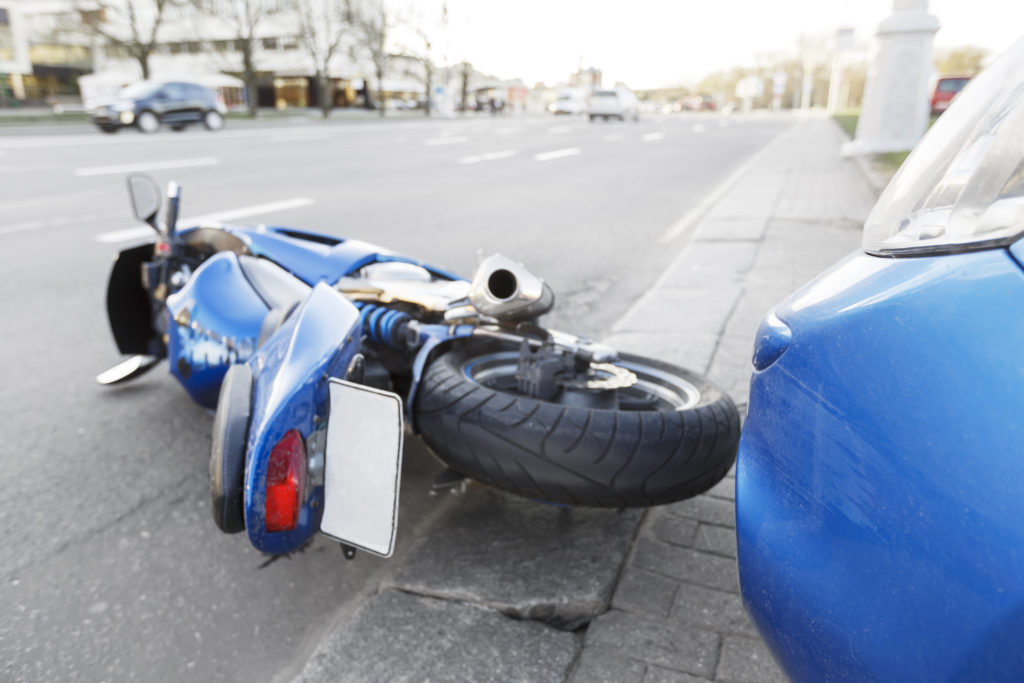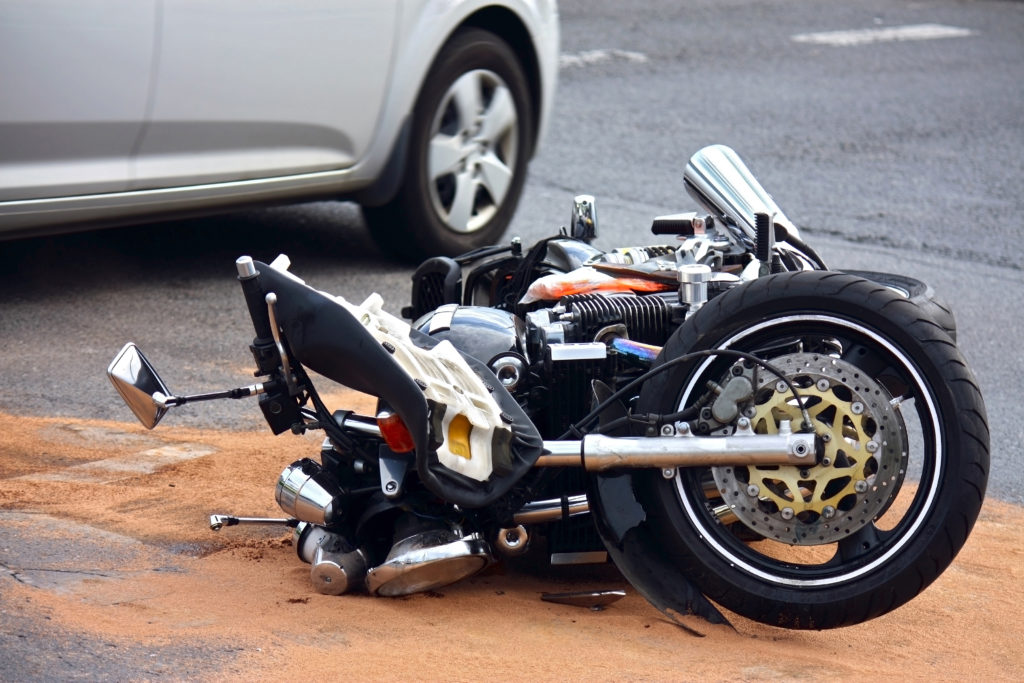Virginia Beach Motorcycle Accident Lawyers
Each year, motorcycle accidents across Virginia result in numerous injuries and deaths. In 2018 alone, the Virginia Highway Safety Office reported that 1,392 motorcyclists were injured and 86 were killed. Nationally, about 4,985 motorcyclists died, according to the National Highway Traffic Safety Administration (NHTSA). The NHTSA also finds that motorcyclists are 35 times more likely to be killed in an accident than those riding in the passenger car.
Virginia laws allow motorcycle riders who are injured to possibly recover compensation for damages above what insurance covers. After a motorcycle accident, the victim should speak to a lawyer who can help them. A lawyer will determine the next steps to take.
How can a Lawyer Help Me After a Motorcycle Accident?

A skilled lawyer can help a motorcycle collision victim who is facing devastating financial losses after an accident. Virginia is a contributory negligence state. This means that victims cannot recover compensation if they were even one percent at fault for causing injuries or damages in an accident. This rule can make it challenging for an accident victim to recover damages, so a lawyer needs to guide their client through the process. A lawyer can do the following:
- Help the victim understand their rights under Virginia law.
- Protect a victim’s rights to receive full compensation under the law.
- Seek all the damages available to compensate for physical, emotional, and financial suffering after a motorcycle accident.
- Prove negligent drivers liable for the accident.
- Hold negligent drivers financially accountable.
- Manage the complex legal process and deadlines.
What Does Motorcycle Insurance Cover in Virginia?
In Virginia, vehicle drivers must carry a minimum amount of insurance or pay an uninsured motor vehicle fee of $500. This fee does not provide insurance coverage; it simply allows a person to drive an uninsured vehicle.
Most drivers choose to purchase insurance. Minimum coverage includes:
- $25,000 coverage for one victim’s injuries or death per accident.
- $50,000 coverage for bodily injury or death per accident.
- $20,000 coverage for property damage per accident.
Drivers can purchase higher amounts of the above coverages. They can also purchase personal injury protection (PIP) insurance, as well as:
- Collision Coverage: Covers the repair or replacement of a damaged motorcycle.
- Comprehensive Coverage: Compensates for damages caused by fire, wind, water, theft, or vandalism.
- Uninsured/Underinsured Coverage: Protects motorcyclists if the at-fault motorist had no auto insurance.
While personal protection and additional insurance are beneficial, they might not be enough to cover a victim’s total damages. For example, an accident caused by a negligent driver can put the motorcyclist in the hospital with serious injuries. Medical bills could quickly exceed $25,000. Add in lost wages and the cost of future treatment and care, and the victim could end up with hundreds of thousands of dollars in bills and potentially no income. Since medical bills will likely be beyond the limits of the policy, it is imperative to speak to a lawyer after a motorcycle accident. Virginia law allows accident victims to file personal injury lawsuits against negligent parties to cover medical bills, lost wages, reduced earning capacity, and even pain and suffering.
What are Common Causes of Motorcycle Accidents?
A primary cause of motorcycle accidents is the car driver’s recklessness around motorcycles. Some typical causes and types of motorcycle accidents include:

- Cars making left-hand turns. This is the cause of more than 40 percent of motorcycle accidents, according to the NHTSA. With its smaller size, a motorcycle may be less visible than a car or truck, but this does not absolve a driver from fault.
- Head-on collisions. A driver might lose control of their vehicle or veer from their lane, striking a motorcycle head-on. Head-on collisions almost always cause severe injury or death to the person on the motorcycle.
- Speeding and changing lanes unsafely. A vehicle driver who is not obeying the rules of the road, such as speeding or changing lanes unsafely, increases the likelihood that a nearby motorcyclist will be injured.
- Rear-end collisions. A car traveling too fast or whose driver is distracted could run into a stopped or moving motorcycle, often causing the motorcyclist to be ejected from or crushed by the bike.
- Sideswipe accidents. Motorcycles can be sideswiped the same as cars. The only difference is that a motorcycle rider does not have the protection a vehicle offers.
- Drunk driver. A drunk driver can cause an accident with a motorcycle as well as a vehicle. A motorcyclist is more susceptible to severe physical damage, such as brain injuries.
- Distracted driving. Vehicle drivers may be talking or texting, eating, listening to loud music, engaging with passengers, or are otherwise distracted enough not to see a motorcycle rider.
- Road conditions. While a municipality or government cannot be responsible for every piece of debris in a road, there are instances where their negligence in maintaining a road caused severe injury to a motorcycle driver.
A motorcyclist is responsible for their own safety and must always drive with the utmost caution. However, in some cases, they cannot prevent an accident that is caused by a negligent motorist.
Should I Sue After a Motorcycle Accident?
An accident victim in Virginia can sue a negligent driver for personal injuries with these restrictions:
- Statute of Limitations: Victims must file a lawsuit within two years of the date of the accident when seeking damages.
- Pure Contributory Negligence: If a victim is found to be just one percent at fault in the accident, they may lose the right to sue.
There may be limits on the amount of damages that can be awarded in a lawsuit, depending on the circumstances.
There is no universal answer to whether one should sue after a motorcycle accident because every circumstance is different. A lawyer can help a victim understand their rights under the law.
When Should I Speak to a Lawyer?
If any of the following circumstances apply, then a consultation with a lawyer could be beneficial:
- There was a serious injury or death. It is not always easy to determine the severity of an injury. Some injuries may appear minor at first or may not even show up immediately. Later, a victim might experience pain or other symptoms that can be traced back to an accident injury. Other times, an accident victim will experience long-term or even lifetime suffering. It is always best to seek medical help after an accident, even if injuries are not apparent. Consulting a lawyer as soon as possible is also essential.
- The accident caused the victim to be unable to work, either temporarily or permanently. Some injuries could even result in a person being completely unable to work or unable to work in a capacity similar to how they worked before the accident. Recouping current and future lost wages for the victim is an integral part of a lawyer’s job.
- Another driver’s negligence most likely caused the accident. Many motorcycle accidents are caused by negligent drivers. A lawyer will need to prove that the victim is not liable for injuries or damages in any capacity.
Anyone considering a lawsuit after a motorcycle accident should take advantage of a consultation with a lawyer as soon as possible. Waiting too long can jeopardize a lawsuit because of the following factors:
- Evidence that is needed to prove negligence can be lost.
- Witness and victim recollections of what happened may fade.
- Insurers could use the delay as a reason to deny a claim.
- The two-year statute of limitations may expire.
Building a strong case takes time and legal prowess. Getting a lawyer started as soon as possible is beneficial for them and the victim.
What are Common Motorcycle Accident Injuries?
Common injuries in motorcycle accidents include:
Traumatic Brain Injuries (TBIs): According to one NHTSA study of 104,472 motorcycle accidents, TBIs were the cause of 54 percent of the deaths within the group. In addition, 15 percent of the helmeted riders and 21 percent of the unhelmeted riders suffered a TBI.
Skull, Face, and Neck Fractures: Helmets do not always adequately protect a motorcyclist’s skull, face, or neck from a minor or severe impairment.
Lower Body Injuries: Since motorcyclists and their passengers are not protected, injuries to the lower extremities are common. Pelvis, leg, ankle, and foot damage includes soft tissue injuries, as well as broken and fractured bones.
Internal Injuries: A motorcycle accident victim will often have internal injuries caused by either blunt force trauma from hitting the ground, an object, or a vehicle. Internal injuries include organ damage, internal bleeding, and loss of organ function.
Spinal Cord Injuries: The impact of a motorcycle accident can cause severe damage to a person’s spinal cord, often resulting in full or partial paralysis, either temporarily or permanently.
Broken Bones and Fractures: Motorcycles will often fall over in an accident, crushing wrists, arms, legs, and other body parts underneath them. The impact from the negligent driver’s vehicle also can break bones.

Amputations: The lack of protection on a motorcycle can result in extremities being amputated or so severely injured that they need to be amputated.
Burn Injuries: Running motorcycles and cars are hot, and they are also susceptible to catching fire after an accident. Burns are common in motorcycle accidents.
Road Rash: A rider who makes contact with the road will often suffer severe skin abrasions called road rash, even if they wear protective clothing. Road rash can range from mild to severe but always requires prompt care to avoid infection and potential permanent scarring.
Cuts, Bruises, and Lacerations: These types of injuries can happen anywhere on the body and can be severe and cause lasting disfigurement.
Musculoskeletal Damage: This is a blanket term for injuries to muscles, bones, ligaments, and tendons. These types of damages may be evident after an accident, but some occur months or even years later. That is why it is crucial to seek medical attention whenever a symptom appears after a motorcycle accident. A common musculoskeletal damage is whiplash, which causes injury to the neck and may not show up right after an accident.
How Do I Recover Costs for Motorcycle Accident Injuries?
A lawyer will need to navigate the legal process when trying to recover costs for medical bills and lost wages after a motorcycle accident. However, a motorcyclist can provide some helpful actions after an accident that could help immensely in a lawsuit:
- If able, take photographs and videos of the accident scene, including the position of and damage to vehicles, bodily injuries, road conditions, background, and strewn vehicle parts.
- Talk to bystanders and other witnesses about what happened. Get witnesses’ names and contact information.
- Record one’s memories as soon as possible after the accident while details are fresh.
- Always seek medical attention offered at the scene, promptly after the accident, and whenever symptoms that can be traced back to the accident occur.
- Heed medical advice and keep follow-up appointments as well as appointments for physical and other therapies.
- Keep records of all medical visits, including plans of care, diagnoses, and prognoses.
Make a folder that includes medical receipts related to care after the accident, including:
- Visits to medical providers and specialists
- Ambulance costs
- Intensive care stays
- Hospital stays
- Surgeries
- Prescriptions
- Medical equipment
- Home care
- Nursing homestays
- Rehabilitation
- Physical therapy
- Psychiatric care
- Costs related to hiring someone for cleaning, driving, and caring for children.
Keep records and copies of all communications with an employer regarding lost wages, salary, time off benefits, and anything else related to the inability to work due to accident injuries.
Never accept compensation an insurance company offers. Insurers will generally offer way less than the actual costs of recovery and lost wages/loss of earning ability. Consult with a lawyer before agreeing to anything an insurer offers.
Damages in a Motorcycle Accident Lawsuit
The cause of the crash and the severity of injuries and damages will impact recovery. Each case is different. However, if a victim is 100 percent not at fault for their accident, they can file a personal injury lawsuit to recover some or all of the following:
- Medical care bills, current and future.
- Cost to repair or replace the motorcycle.
- Lost wages, either temporary or permanent.
- The costs for activities that a victim must now hire other people to do, such as housecleaning, yard care, shopping, driving, and child care.
- Pain and suffering.
If the motorcycle accident was fatal, a loved one might be able to file a wrongful death lawsuit. A victim should consult a lawyer after a motorcycle accident to help with their case.



